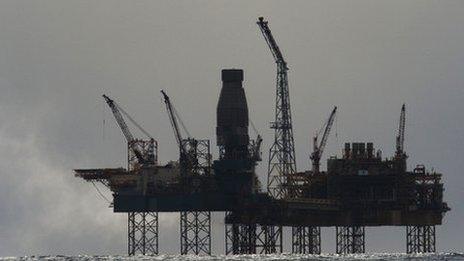High pressure drilling for tax
- Published

The chancellor announced tax break and closed loopholes for the offshore industry
If you're facing ultra-high pressure and high temperature, George Osborne has a little something to help out.
This is not the first time the Treasury has tried to find a way to unlock investment in such tough-going oil wells.
And included in Budget 2014, the tax break was welcomed by the offshore industry. It's reckoned that move alone could unlock up to £6bn of investment.
But of course, there's more high pressure and sizzling temperature to the taxation of oil and gas than just the gloopy stuff locked in geological formations.
The chancellor also had some news that the industry doesn't like at all, closing what the Treasury sees as loopholes.
He set course for what ought to be a high-stakes negotiation on a big change to Britain's offshore tax regime.
And what got most attention was the chancellor's warning that falling revenue is not something on which an independent Scotland can rely to pay its public services bills.
Budget Responsibility
Mr Osborne knows a thing or two about struggling to pay his bills. The deficit looks like an eye-watering £108bn, and will take until 2018 to turn to surplus - depending on public spending service cuts that are not yet half way through.
This is based on statistics from the Office for Budget Responsibility, which yet again downgraded its forecasts for oil and gas revenue.
The combination of corporation tax and petroleum revenue tax are now on course, according to the OBR, to fall from £6.1bn last year (more than 40% down on the previous year), to £4.7bn in the current year.
The subsequent years see the trend slow up, but remain in a downward direction; £3.7bn, £3.8bn, £3.2bn, £3.4bn and £3.5bn in 2018-19. Put together, and in only three months since the OBR's last forecast, that's a total drop of £3bn in tax take over those years, with the forecast for next year alone down by £900m.
Most finance ministers would consign that kind of problem to the small print. They certainly wouldn't welcome it. But for George Osborne, it was a very welcome political weapon to use against the case for Scottish independence.
Those OBR figures are far removed from the the Holyrood government's assumptions about the oil and gas remaining under Scottish waters, and how much it can count on the revenue if it becomes independent.
Supporters of independence are doubtful about the OBR's autonomy in reaching these numbers. Opponents are wondering when St Andrew's House is going to update its own estimates, in the light of disappointing recent out-turn figures.
For those of us trying to make sense of a very important part of the debate on Scotland's finances, the divergence of the story on oil and gas is only getting wider.
High stakes
The backdrop to this, apart from the independence debate, is Sir Ian Wood's report into maximising extraction of oil and gas from UK waters. It was recently published, alongside industry figures showing industry costs have been soaring.
Sir Ian said there should be a new regulator with powers to require companies to invest and maximise output in the national interest rather than the corporate interest of maximising return on capital.
The Budget paperwork told us there's going to be a director of that new, arm's-length regulator in July.
It should be up and running by October.
In this year's autumn statement, the Treasury will have its own proposals for a new tax regime intended to incentivise drilling and production, and the new regulator will have made its own assessment by next year's Budget, with legislation for the new regime in place for April next year.
The stakes in that process are very high for the industry, and for the future of those tax revenue figures. The industry welcomed the change in tax regime, presumably in the expectation that its tax bill is on the way down.
However, the talk of co-operation between government and industry since the rift resulting from the 2011 Budget tax raid has hit sour notes on the subject of closing of tax loopholes.
One was to ensure that the chartering of drilling rigs for operation in UK waters is also taxed in the UK.
It came after warnings that costs had already been going up and that the lack of new drilling represents the biggest challenge the industry has faced in 40 years.
By making it more expensive to charter offshore assets, industry insiders say international demand for scarce drilling rigs could take them away to more attractive tax regimes.
This sounds a technical tax issue, but a significant one financially, estimated to add at least £130m to the drillers' costs.
"The impact on the industry could be significant due to the low forecast margins for many new and incremental projects," according to Martin Findlay, KPMG's tax partner in Aberdeen.
"This will weaken the UK's competitive position for attracting investment."
Colin Pearson, tax partner at EY in Aberdeen, went further: "With a tight rig market and cost pressures already acute, any additional costs will undoubtedly have an adverse impact on activity.
"The recent Oil & Gas UK Activity Survey highlighted the parlous state of exploration in the sector - a problem that is likely to be exacerbated by this change." He went further on the possible costs, with an estimated cost to the industry of as much as £175m per year.
This wasn't a surprise in the Budget. It had been flagged up, as had a change in the way freelance and agency offshore staff are taxed, which Colin Pearson says could put an additional £300m on costs. The industry had warned against those changes too, but its lobbying has been unsuccessful.
It doesn't augur well for those negotiations on a new fiscal regime to maximise extraction. In talks with this industry, whether the government's in Edinburgh or London, we're all over a barrel.